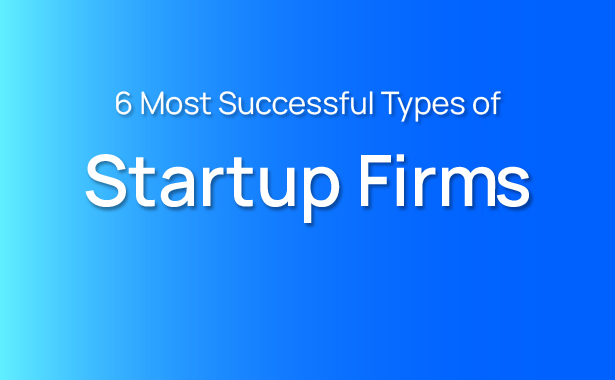Contents
Startups have been a buzzword, a new way of looking at business, and a management model through the last decade. They’re still going strong as more and more entrepreneurs launch starting businesses and take their chances. The term “startup,” however, is more of an umbrella term than most people would think. It’s an understatement to say there are different types of standups — the variety is really considerable. Here, however, I’m going to focus on the most successful types of start-up firms and see what makes them tick. Startups and small businesses working on agile principles can optimize and upgrade their operation and business model much more quickly. That’s why this guide is not only for entrepreneurs looking to start a new business but also for startup and small business owners trying to course-correct or grow.
Before going into the details, however, I’m going to go over some definitions and basics just to make sure we’re all on the same page.
What Does “Different Types of Startup” Mean?
A startup might be anything from a barbershop to a high-flying AI firm — and everything in between. Most startups do not necessitate venture capital investment or a team of MIT-trained engineers and Harvard MBAs. The conventional perception of a startup as a venture-funded high-growth business is completely incorrect. In truth, the vast majority of successful firms do not receive outside capital and develop steadily but slowly. There are various types of startups. If you are thinking about starting your own business, it is critical that you grasp the variations in their investment requirements, risk profiles, lifestyle implications, and upside possibilities before deciding which type best fits your business idea, personality, and lifestyle objectives.
Criteria for Different Startup Firms
First, we must look at the criteria that we’ll use to compare and differentiate startups here. It’s mostly a question of how large a startup can grow and how profitable it may turn out. Basically, these two questions, along with where the funding comes from, determine the fate of a startup, making or breaking any starting business. The following list uses these criteria to distinguish
Growth And Potential Size
Will your company develop quickly to a large scale, or will it grow slowly but steadily? The following traits are shared by high-growth businesses:
-
A big addressable market, such as cellphones or search engines.
-
A new technology or business strategy that will be quickly adopted by your customers.
-
The business model is extremely scalable. Because technology is often the enabler of such scalability, the majority of fast-growing companies are tech firms.
-
Due to the possibility of rival entry, very swift execution is required.
What amount of external finance would you require to establish your business, and who will give it? The answer to this question will have the most impact on the type of startup you create. Startups that require significant outside funding have the following characteristics:
The need frequently drives their significant capital requirements to a) execute fast ahead of competitors or b) build assets (IP, market share, patents, and so on) that will deter competitors from joining the market.
To tempt external backers, a company must have a well-outlined exit strategy from the start.
The founder(s) will almost certainly have to share control of the company with other sources (such as venture capital firms or private equity firms) who will have influence and control over the company’s future direction.
Because of the finance and organizational structure of the company, such a startup cannot be conducted as a “mom and pop” or “lifestyle” firm.
There is a strong correlation between the responses to the two preceding questions; high-growth enterprises with enormous prospective markets frequently demand large upfront external investments and are thus venture-backed.
The 6 Different Types of Startups
Startups are grouped into the five categories listed below. This list is not exhaustive, but it does provide an analytical framework for evaluating your startup and the decisions you will have to make when it launches and grows.
A lifestyle business allows you to work on your own terms (you choose your own working hours and location) while still paying you well enough that you find the work rewarding. A lifestyle business may use the founder’s existing experience or knowledge and is frequently founded by a well-connected person who has retired from a high-profile career or profession. They do not require a physical location and are frequently conducted online (through internet-based collaboration and communication technology) by the creator. Such enterprises include business consulting and financial advising.
A lifestyle business, on the other hand, can be built on a pastime or passion; such an entrepreneur enjoys her work while being her own boss. Examples of such hobby-based lifestyle enterprises include a professional photographers, a surfing coach, and a web designer. Aside from the entrepreneur, such a business often employs no or very few support personnel.
Such lifestyle enterprises are unlikely to become fast-growing companies with a large workforce, but they can give the entrepreneur a very good and rewarding living.
The majority of startups in the United States do not obtain any outside capital.
Classic Small Businesses
The vast majority of entrepreneurs in the world today are engaged in what is best described as a traditional small business. This category includes companies that are well-known for having a stable but modest growth profile. Such businesses include grocery stores, hairdressers, consultants, IT consulting firms, insurance agents, Internet commerce storefronts, carpenters, plumbers, electricians, and so on.
A franchise business is another common example of this type. A franchise offers a stable business framework to the entrepreneur looking for structure, guidance, and marketing assistance. A franchise may necessitate a substantial upfront investment as well as continuous royalty payments to the Franchisor. However, a franchise might be a fantastic option for an entrepreneur with minimal beginning expertise but the finances to spend on franchise startup expenditures.
Most small businesses are not built to scale – the founders want to own their company and provide for their families. Such enterprises are not particularly profitable, especially if the founders are paid market rates. Their only source of capital is their personal money, which they can borrow from family members and banks. Small-business owners do not become millionaires or make prominent media appearances. However, in terms of sheer numbers, they are far more indicative of “entrepreneurship” than other types of entrepreneurs—and their businesses generate the great majority of local jobs in most economies.
Self-Funded Growth Company
This category includes a business that is formed with the explicit purpose of growing into a huge enterprise but does not seek outside finance. In this case, you fund the initial expenditures using your own assets or credit. You eschew external equity financing in order to keep ownership of your business. This type of business is typically founded by someone who is either independently affluent or has been successful with previous companies and wishes to pursue the next concept.
It should be noted that a company in this category may seek external finance in the future after it has grown to the point where it can fetch a good valuation. The crucial difference is that such a business does not require external capital to get started; the entrepreneur can fund the startup with her own money.
Scalable Externally Funded Startup Business
This is the category that best defines Silicon Valley technology startups; examples include Facebook, Uber, and Cloudera. The founders believe they have a revolutionary idea that will “transform the world.” They need sufficient external funding to do it soon. Unlike small-business owners, these founders are not concerned with simply making a living, but in acquiring a major equity stake in a firm that will eventually become publicly traded or acquired, resulting in a large return for them and their investors.
To support their hunt for a business plan, scalable businesses require risk financing. They only hire the finest and brightest. When they find it, their emphasis on the scale needs even more venture capital to fuel rapid growth. Such initiatives either flourish spectacularly or fail catastrophically, resulting in a significant loss of wealth.
The following are some features startups in this category share:
- Large potential target market size
- Innovative concept or business model
- Highly scalable business model
- Ability to execute quickly in order to stay ahead of competitors. This necessitates high-quality talent acquisition and R&D.
- Significant outside funding.
- Multiple rounds of fundraising create complex financial structures.
- Founders’ loss of control.
- There is no medium ground, either extreme success or failure.
- All participants have a “swing for the fences” mentality, which leads to a high-pressure lifestyle and poor decisions.
- The need for an active public relations campaign and significant news coverage
These are enterprises that are intended to be acquired by a larger corporation at some point in the future. These companies have numerous features with the preceding category (Externally Funded Scalable Startup), but their intended market size is not as vast. Businesses in this category are frequently attempting to apply a proven globally successful business model to a local or niche market.
The cost of launching a technology firm has dropped dramatically in the last five years. Many of these firms avoid typical venture capitalists by utilizing crowd or angel investment. While it may be possible to establish a considerable value in some situations, the lack of typical venture-capital investors (and the associated large exit dynamics) relieves the strain of “swing for the fences” liquidity ambitions. This type of startup is likely to be acquired by a larger corporation for $5 million to $50 million. The creators and investors go away with millions rather than billions of dollars.
The markets where this type of startups compete in are relatively small and narrow yet well-defined; sales in the hundreds of millions rather than billions.
In addition to other significant corporations.
Act as R&D for the larger acquisition on occasion. While large acquiring firms carry out well-known business models, such startups serve as transitory entities aimed at finding a scalable and repeatable business strategy without incurring risk to the acquirer. For example, consider medical drug discovery startups.
An Externally Funded Scalable Startup may fall into this category if the parties involved realize that the potential market for the startup is not as large or lucrative as they had anticipated.
As I said before, these types of start-up firms place different demands on the founders’ skill set and have radically different ramifications for their lifestyle. While financial gain is a common motivator for many people who start their own businesses, it is by no means the only motivator. Whether you desire more schedule flexibility, the freedom to make your own company decisions, celebrity, or a better payout, it is vital to understand a) why you want to start a business and b) whether the type of startup you are considering matches your goals and capabilities.
Take stock of your skillset before investing the time, effort, and money required to launch a new firm. Do you get along well with others? Do you cope well with uncertainty? Are you an effective public speaker? Do you know what accounting is? Are you an extrovert with a vast network of professional contacts? Make a list of the talents, knowledge, and assets you already have, as well as those you do not. You will need to seek assistance in areas where you are inadequate. This assistance can take the form of co-founders or employees. Honesty at this time will spare you from shame, debt, and failure later on. Knowing what you don’t know and being confident enough to seek assistance when you don’t know is critical to the success of your business.
Whatever form of startup you are considering, you should be aware that the only thing they all have in common is that they are dangerous. In fact, nine out of ten startups fail, owing to the fact that they build a product that no one wants. Can you tolerate the high risk of walking away with little to show for your stress and sacrifice? Worse, the dissolution of your firm may have severe personal effects, such as bankruptcy, house foreclosure, divorce, and loss of reputation.
When it comes to beginning a new business, the willingness to tolerate setbacks and failure is critical. If you’re the type of person who gets irritated, upset or simply shuts down when things don’t go your way, establishing your own business might not be the best road for you.
How to Maximize the Chances of Success for Your Own Starting Business
So, we’ve gone over the different types of startups — what now? Which one will be the right one for you? The difference between types of start-up firms also means putting in a different amount of commitment and talent, facing various levels of complexity, and securing different financial schemes. As an entrepreneur looking to launch or grow your business, it’s critical to learn and understand this dynamic between types of start-ups and their demands. That will ensure you can start or pivot toward a type of startup that is a good fit for your strengths and plans.
Whatever type you choose, however, starting a business or growing it is tough work, especially if you’re a solo entrepreneur or only have a very small team. Trying to deal with different sides of the company and product can be like dealing with the hydra — too many heads to handle. That’s why the tools you choose as an entrepreneur or startup owner are critical to your success. The tools any starting or small business needs to thrive are more or less obvious: an app to handle email marketing, a scheduling app, maybe a business phone VoIP service, and an invoicing and payment system. Even if you have not started using these industry-standard tools yet, you can already sense how messy things can get, let alone how expensive it will turn out, subscribing to all these apps. Of course, you can also get RunSensible — the all-in-one business management platform that literally includes all the tools you need to make it, from marketing to sales to inventory and payment. Why not try RunSensible now?
FAQ
Is it important to know about the different types of startups?
Yes, it’s actually vital — even if you already have started up your own business.
Do all startups need outside funding?
Not at all. In fact, data shows that most American startup companies don’t get any outside funding at all.
Can you change the type of a startup business once you’re already started?
With some agile management and the right approach to pivoting, an entrepreneur can course-correct his startup into a more suitable model.
Disclaimer: The content provided on this blog is for informational purposes only and does not constitute legal, financial, or professional advice.






